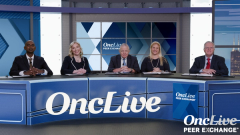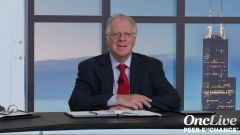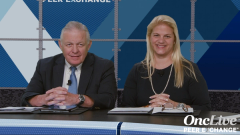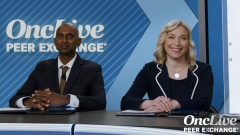
Future Directions in Care for HER2+ Breast Cancer
Before closing out their panel on HER2+ breast cancer, expert oncologists share closing thoughts and their excitement for the evolving treatment landscape.
Episodes in this series

Transcript:
Andrew Seidman, MD: This has been an incredible discussion. I’d like to close by giving everyone 30 to 60 seconds to say what they feel is the most important thing that we’re taking away from Chicago [American Society of Clinical Oncology Annual Meeting], apart from the fact that we’re all able to see one another in 3-dimension instead of in 2. VK, do you want to lead? What are you going to come home with and tell your family and friends that you’re excited about?
Vijayakrishna Gadi, MD, PhD: Clearly being able to expand a new therapeutic option. A window for something entirely different for majority of our patients who are hormone receptor positive is really exciting. Where I’m going to struggle now is cherry-picking the right patients. Bone metastasis, progression in the bone, no visceral disease—I’m going to be scratching my head, but maybe capecitabine is still the right option there. Those are the types of Monday morning questions I’m going to struggle with.
Andrew Seidman, MD: Stephanie?
Stephanie Graff, MD: Obviously, DESTINY-Breast04 was the star of ASCO [American Society of Clinical Oncology Annual Meeting]. I’m still giving standing ovation on Wednesday morning. In that enthusiasm, it’s going to be important that we don’t carry that enthusiasm into coloring outside the lines. Should we be considering it instead of CDK4/6 inhibitors? No. Should we be pushing our pathologists to change that HER2-0 to HER2-1? No, that’s not what these data say. Just staying tried and true to the eligibility criteria of the study is important.
Andrew Seidman, MD: Bill, is this going to change the NCCN [National Comprehensive Cancer Network] Guidelines?
William Gradishar, MD: We’re adding several pages.
Tiffany Traina, MD: It’s going to come with reading glasses.
William Gradishar, MD: Every time we go to an ASCO or San Antonio [Breast Cancer Symposium] meeting, we compare it with the time when you and I started, which was a long time ago. We fiddled with what handful of chemotherapy drugs we had and maybe the schedule. That was the big question. Every meeting we have new drugs, we understand more nuance or maybe we don’t understand, and we’re trying to figure out the nuance of how to use these drugs optimally. It’s exciting to juxtapose those 2 time periods next to one another.
Andrew Seidman, MD: We have that long view of the world. There’s a lot to be excited about. Tiffany?
Tiffany Traina, MD: I’ll echo my colleagues. With DESTINY-Breast04, trastuzumab deruxtecan is available for HER2-low. We saw some overall survival data from CDK4/6 inhibitors for discussion in our hormone receptor–positive population. We see new exciting targets like HER3 and the ADC [antibody drug conjugate] role there. As you beautifully described how components of an ADC have impact, it has allowed us to revisit some old drugs that were abandoned historically because they were difficult to administer systemically. But now with just a few molecules, they might have new life.
Andrew Seidman, MD: Absolutely. I want to thank this panel for a robust evidence-based discussion. I want to thank those of you joining us. We hope you found this OncLive® Peer Exchange® discussion to be useful, practical, and valuable to you in the treatment of your patients with HER2+ and HER2-low breast cancer. Thank you.
Transcript edited for clarity.








































